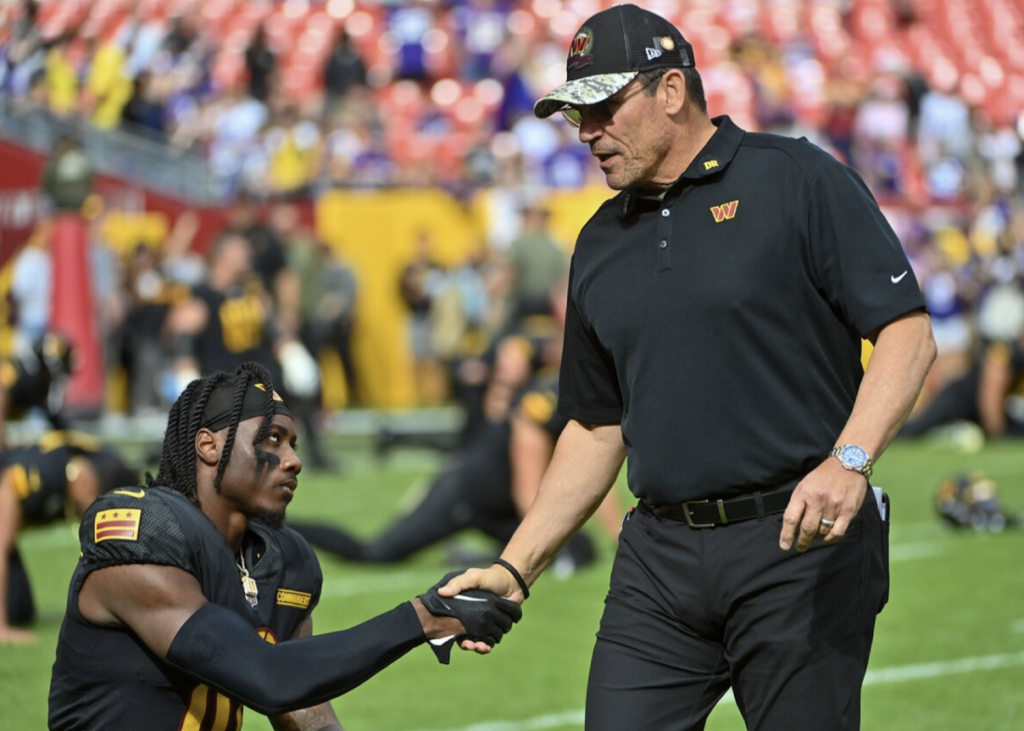Leaders Listen: Washington Commanders Head Coach Ron Rivera Speaks at CUA

Image courtesy of Jonathan Newton/The Washington Post
By Margaret Adams
Fans and players alike gathered in the Pryz Great Rooms on Friday, March 24 to see Ron Rivera, head coach of the Washington Commanders Football Team, speak about leadership and his experiences. Catholic U Leadership, the Office of Campus Activities’ Leadership Program, hosted the keynote speaker.
Ron Rivera is an iconic figure in D.C. culture. He has been awarded Head Coach of the Year in 2013 and 2015 during his time with the Carolina Panthers, leading them to Super Bowl 50. He is also one of the few NFL coaches that played in the NFL: he played for the Chicago Bears from 1984-1992. After being named head coach in 2020, Rivera led the Commanders to the playoffs.
Among the most impressive things on Rivera’s resume is that he is the only coach to lead two NFL teams with a losing record to the playoffs, both the Commanders and the Panthers.
Freshman business operations management major Keli Georges expressed her excitement for the event going in.
“One of the main reasons I wanted to come, with him being such a popular person in the sports community, to hear what he says about leadership and management,” Georges said. “Particularly, I was curious to see what he says about that from someone who manages such a big organization that’s watched by a lot of people on TV.”
The talk opened with opening remarks from CUA football’s head coach, Mike Guteliu. He spoke about Catholic U Leadership and their mission to emphasize inclusive leadership and create communion among the student body. He then introduced Rivera, mentioning that his experience and background as a Latino Filipino Catholic coach has informed his approach to leadership.
On top of his many accomplishments in the NFL, Rivera has shown his bravery off the field as well: he is a cancer survivor. He was diagnosed with squamous cell cancer in 2020 and defeated it in early 2021. Despite the diagnosis, Rivera did not miss a single Commanders game.
Rivera opened with his background: his father served 32 years in the army, which helped him learn about structure early, as well as form a leadership approach. He grew up Catholic, which gave him a strong faith to build his foundation on. He then showed a video illustrating examples of leadership on the Commanders; team players building each other up, taking accountability in the locker room, and playing with passion on the field.
Rivera’s first point had to do with why leadership matters: impact. The purpose of effective leadership is to create an impact on the team and the community they’re supporting. His second point concerned identity; Rivera emphasized that leaders come in all shapes and sizes, and all religions and ethnicities. He illustrated examples of diverse leadership in Barack Obama, Mother Teresa, Martin Luther King Jr., Eleanor Roosevelt, and Vince Lombardi.
“There’s nothing that tells you you cannot be a leader,” Rivera said.
He also stated the importance of credentials and experience in a leader; that being said, a leader must invest time and effort in themselves in order to gain experience. He cited his experience volunteering for the Chicago Bears, and his willingness to start at the bottom in order to learn as much as possible.
“In my mind I was gonna do everything I could to show them I was invaluable, they could not let me go,” Rivera stated.
He also advised leaders to find a mentor. His own mentor, John Madden, illustrated leadership excellence to him and aided in his own leadership formation.
Rivera emphasized the importance of instilling and living by core values; his own core values include hard work, harmony, teamwork, listening, and respecting. He spoke about the significance of harmony, highlighting the importance of being present. He tells his players to “be where your feet are.”
He also clarified that listening is essential to a leader: communication does not just refer to speaking. He cited a personal example from when he worked as the Carolina Panthers head coach when he made a rash decision of letting a coach go without listening to everyone’s opinions. He was later able to rehire the coach, and admitted his mistake. This led him to his next point: accountability. Leaders first look for accountability inside themselves before anybody else.
All of these details lead to an overarching goal, what some call a dream. Rivera does not describe this as a dream though; he prefers to use the word “vision.”
“Vision is what you see can happen, a plan for an ultimate goal,” Rivera said.
His vision for the Commanders is to create and maintain a “sustainable winning culture.” Even if the Commanders do not win every game, their strong and favorable culture supports them, cultivates passion, and pushes them to do better.
The talk closed with an open Q&A section and CUA students, parents, and faculty walked away with a newfound sense of leadership and motivation to make an impact on the community around them.
“You must take them to where they’ve never been. This is one of the primary goals of the leader, is to take the group to where they’ve never been…” Rivera urged. “You gotta make sure you show these people ‘this is what we’re gonna do, this is how we’re gonna do it, and we’re gonna go somewhere we’ve never been.”





